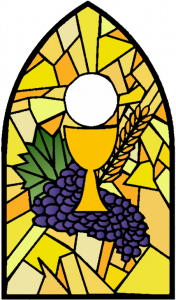
Understanding the Eucharist
A new covenant
The Eucharist symbolises the new covenant given by God to his followers. The old covenant was the one given by God to Israel when he freed his people from slavery in Egypt.
The new sacrament symbolises freedom from the slavery of sin and the promise of eternal life. According to the Synpotic Gospels of Matthew, Mark and Luke, the Eucharist was instituted by Jesus, who said the following:
Take, eat, this is my body… Take, drink, this is my blood… Do this in remembrance of me.
Jesus
What it means
Christians believe that the piece of bread that is “taken, blessed, broken and given” becomes the life of Jesus, the body of Christ.
But they don’t all mean the same thing by it, and some of the biggest disputes among Christians are about exactly what they do mean.
Different churches, different meanings
Although all denominations recognise the importance of the Eucharist, they differ about its meaning.
Roman Catholics believe that the bread and wine that is offered is the actual body and blood of Christ and another form of sacrifice. They believe that although the bread and wine physically remain the same, it is transformed beyond human comprehension into the body, blood soul and divinity of Jesus. This is called Transubstantiation and is celebrated in the festival of Corpus Christi.
Protestants believe that Jesus made his sacrifice on the cross and simply follow the tradition of the sacrament in memory of the event, recalling its symbolic importance in the life of Jesus.
Churches also differ in how often they receive the Eucharist. The more importance a Church places on the sacraments, the more often its members will receive the Eucharist.
For Roman Catholics, the Eucharist is the most important act of worship. All Roman Catholics are encouraged to receive communion at least once a week during Mass. Some practising Catholics may receive the Eucharist every day.
Other denominations receive Holy Communion less frequently and usually services are held once a week or every few weeks.
No magic
It’s very easy to get stuck into complex arguments about what happens to the piece of bread; what exactly it turns into, and how. There’s a risk that if people get stuck in an argument about magical changes in bread they’ll forget that they are part of the ritual, and the way they respond to it is a vital part of the package.
But you can get a great deal of meaning about the Eucharist without worrying about that.
Christians say that there is a common action in what happens to the bread, and what God has done with Jesus and with human lives.
- In Jesus, God took a human body, blessed it, and was broken in it.
- Ordinary Christians believe that God has taken their lives, blessed them, broken them, and remade them.
- The piece of bread is taken, blessed and broken, too.
And in all three of these actions human bodies, or pieces of bread become filled with the life of Christ.
What’s a sacrament?
Christians regard a sacrament as an outward sign of an inward grace or as an enacted truth. But that’s probably not much more helpful…
Here’s another definition: A sacrament is an an action made holy or special because of its believed ability to demonstrate a religious truth, or a truth about God.
Think about it like this… if someone says “I love you” and you believe them, that’s great. If they say “I love you”, and put their arms round you and give you a great big hug, you get the truth of what they’re saying in a different and more powerful way. A hug is an outward sign of the love they have inside.
Or take some of the saints of old who gave their lives for others. Saying that you love all humanity is one thing. Dying to save others is a very powerful way of acting out the truth of your words.
“Something we seldom think about is the Real Presence of Jesus in us, the congregation. We are more than a crowd or an audience but rather an assembly, a gathering of believers, who have been called by the Lord to worship in His Presence. If we were to be asked when the Mass begins we would have to say in the parking lot of the church! When the first two Catholics greet one another the Mass has begun. Jesus taught that when two or three are gathered in His name He is there present. There are more than two or three present for Mass each weekend. When we recognize this Presence of the Lord we begin to see each other in a new way which demands our attention and respect. We are called to be aware of the people around us who believe as we do and have gathered with us to worship our God. After all, our congregation is a community, that is a “common unity”, in Jesus Christ. Our awareness of one another means that we see Jesus in one another and that we are called to show hospitality. We are called to make others feel welcomed, especially the stranger, and to be attentive to the needs of others around us. Our presence is important to the community because it is not complete if we are missing and through our actions we assist others in their worship.” — Fr. Mark Curesky
Is it being politicized? https://www.americamagazine.org/faith/2021/05/24/biden-communion-cordileone-bishop-240731
Our community prepares students to receive First Communion in 2nd grade at both the parish and school. To enroll your child in Faith Formation or to inquire about First Communion for an older child, please call the parish office at 401-739-0212.
For adults, please call or email us to enroll in the RCIA program (Sacrament Preparation for Adults).
